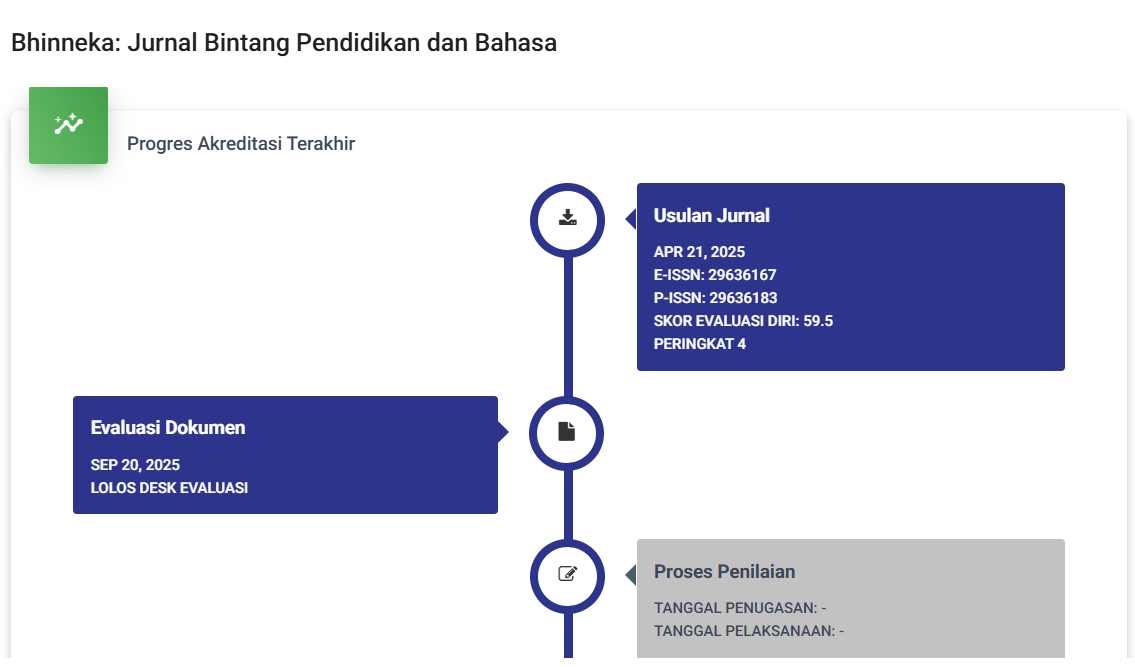Crisis Grammatical Use: Revealing Causes on EFL Students' Grammatical Erros
DOI:
https://doi.org/10.59024/bhinneka.v1i2.272Keywords:
Speaking Ability, EFL Students, Grammatical ErrorsAbstract
This study aimed to find out the causes on EFL Students' grammatical errors in speaking skills for students of English Language Department of Hamzanwadi University. This research employed descriptive qualitative research design. The participants of this study were 27 students from the second semester. The data were collected by three research instruments which were observation, interview, and documentation. The observation results showed that students often used their mother tongue for class interactions, rarely applying English during the learning. Moreover, the results of the interview showed that students faced challenges in applying grammar to speaking skills due to a lack of vocabulary, comprehension, writing-focused approach, and lack of practice. In conclusion, it is important to learn and practice grammar in speaking skill because fluency in grammar and language rules is crucial for students to become qualified teachers and avoid mistakes. Learning and practicing grammar in speaking skill is also essential for long-term capability.
References
Akbari, O., & Sahibzada, J. (2020). Students' Self-Confidence and Its Impacts on Their Learning Process. American International Journal of Social Science Research, 5(1), 1–15. https://doi.org/10.46281/aijssr.v5i1.462
Amoah, S., & Yeboah, J. (2021). The speaking difficulties of Chinese EFL learners and their motivation towards speaking the English language. Journal of Language and Linguistic Studies, 17(1), 56–69. https://doi.org/10.52462/jlls.4
Antakusuma, IK (2020). an Analysis on Students' Grammatical Errors in Performing English Storytelling. Journal of Vidya Karya, 34(2), 163. https://doi.org/10.20527/jvk.v34i2.7580
Chen, MRA, & Hwang, GJ (2020). Effects of a concept mapping-based flipped learning approach on EFL students' English speaking performance, critical thinking awareness and speaking anxiety. British Journal of Educational Technology, 51(3), 817–834. https://doi.org/10.1111/bjet.12887
Diana, L. (2021). Problems Faced In Speaking Assessment During The Covid-19 Pandemic . Case Study of the East Java Veterans National Development University. Journal of Social Sciences and Education, 5(1), 447–451. http://ejournal.mandalanursa.org/index.php/JISIP/index
Erlangga, IPB, Suarnajaya, IW, & Juniarta, PAK (2019). AN ANALYSIS OF GRAMMATICAL ERRORS MADE BY THE SEVENTH GRADE STUDENTS OF SMP NEGERI 2 SUKAWATI IN WRITING DESCRIPTIVE TEXTS IN THE ACADEMIC YEAR 2018 / 2019. 2(1), 19–29.
Hampp, PL, Kumayas, TA, & Lengkoan, F. (2021). Synthesizing Grammar and Structure Problems Faced by Indonesian TOEFL Participants. Undiksha English Education Journal, 9(1), 64. https://doi.org/10.23887/jpbi.v9i1.33811
Jean, MD (2019). The Effect of Classroom Emotions, Attitudes Toward English, and Teacher Behavior on Willingness to Communicate Among English Foreign Language Learners. BIROn - Birkbeck Institutional Research Online Dewaele, 38, 523–535. https://doi.org/10.1177/0261927X19864996
Kashinathan, S., & Abdul Aziz, A. (2021). ESL Learners' Challenges in Speaking English in Malaysian Classroom. International Journal of Academic Research in Progressive Education and Development, 10(2). https://doi.org/10.6007/ijarped/v10-i2/10355
Kurniawan, T. (2023). Errors Analysis towards Collocation Usage. Dewantara : Journal of Humanities Social Education, 2(1), 80–93. https://doi.org/10.30640/dewantara.v2il.665
Laili, I., & A'yun, Q. (2019). Teaching and Learning English Grammar through Discourse for EFL Students Experimental Research on the Bilingual Classes of Eighth Grade Students of State Islamic Junior High School (MTsN) 1 Kudus. 3(November), 89–98. https://doi.org/10.28926/jdr.v3i2.83
Listia, R., & Emma, R. (2020). EFL Learners' Problems in Using Tenses : An Insight for Grammar Teaching. IJET (Indonesian Journal of English Teaching, 1, 86–95.
Mandasari, B., & Wahyudin, AY (2019). Flipped Classroom Learning Model: Implementation and Its Impact on EFL Learners' Satisfaction on Grammar Class Corresponding Email Article's History Flipped Classroom Learning Model: Implementation and Its Impact on EFL Learners' Satisfaction on Grammar Class. Ethical Lingua, 8(1), 2021.
Maulidar, K., A. Gani, S., & Abdul Samad, I. (2019). TEACHER'S STRATEGIES IN TEACHING SPEAKING FOR CADETS. English Education Journal (EJJ), 10(1), 80–94. http://www.jurnal.unsyiah.ac.id/EEJ/
Namaziandost, E., Homayouni, M., & Rahmani, P. (2020). The impact of cooperative learning approach on the development of EFL learners' speaking fluency The impact of cooperative learning approach on the development of EFL learners' speaking fluency. Cogent Arts & Humanities, 7(1). https://doi.org/10.1080/23311983.2020.1780811
Nurfitri, AK, & Rahmawati, E. (2021). The Analysis of Students' Difficulties in Speaking English of Eighth Grade. Annual International Seminar on English Language Teaching, 67–80. https://jurnal.untirta.ac.id/index.php/aiselt
Pakula, H. -M. (2019). teaching speaking. Apples - Journal of Applied Language Studies, 13(1), 95–111. https://doi.org/10.17011/apples/urn.201903011691
Raja, P., Flora, Putrawan, GE, & Razali, AB (2022). English as an International Language: Perceptions of EFL Preservice Teachers in Higher Education Institutions in Indonesia. Education Research International, 2022. https://doi.org/10.1155/2022/3234983
Riadil, IG (2020). A Study of Students' Perception: Identifying EFL Learners' Problems in Speaking Skill. International Journal of Education, Language, and Religion, 2(1), 31. https://doi.org/10.35308/ijelr.v2i1.2256
Ricohermoso, C., Abequibel, BT, & Alieto, EO (2019). Attitude towards English and Filipino as Correlates of Cognition toward Mother Tongue: An Analysis among would-be Language Teachers. Asian EFL Journal Research Articles, 23(3), 142–154.
Rustamova, AE (2023). The importance of grammar in teaching English language. Journal of Pedagogical Inventions and Practices, 17, 39–41. https://zienjournals.com
SARI, RA (2018). Students' Grammatical Error Analysis in Speaking. Education: Journal of Education and Teaching, 5(2), 127–137. https://doi.org/10.19109/ejpp.v5i2.2102
Setiyorini, TJ (2020). The Grammatical Error Analysis Found in Students' Composition. 10(2), 218–233.
Wahyuningsih, S., & Afandi, M. (2020). Investigating English speaking problems: Implications for speaking curriculum development in Indonesia. European Journal of Educational Research, 9(3), 967–977. https://doi.org/10.12973/EU-JER.9.3.967
Yaccob, NS, & Yunus, M. (2019). Language Games in Teaching and Learning English Grammar: A Literature Review. Arab World English Journal (AWEJ), 10(1), 209–217. https://dx.doi.org/10.24093/awej/vol10no1.18








